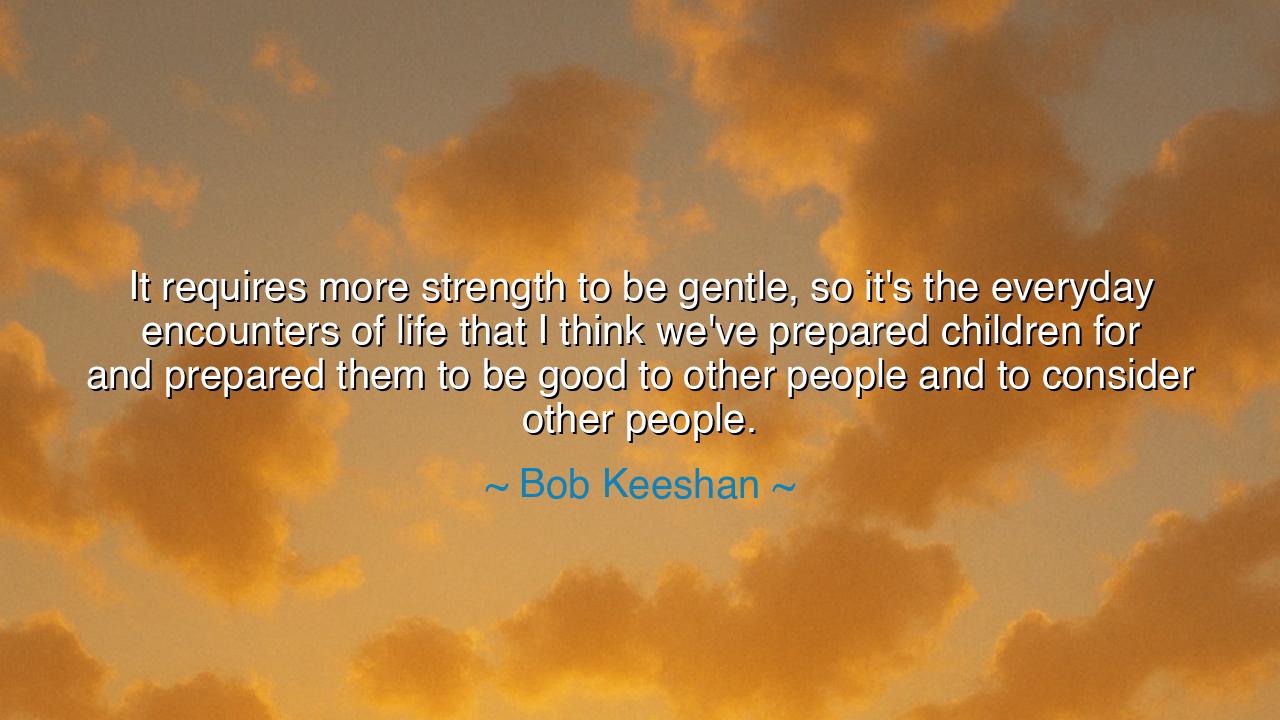
It requires more strength to be gentle, so it's the everyday
It requires more strength to be gentle, so it's the everyday encounters of life that I think we've prepared children for and prepared them to be good to other people and to consider other people.






Bob Keeshan, known to many as the gentle Captain Kangaroo, once gave us a jewel of wisdom: “It requires more strength to be gentle, so it’s the everyday encounters of life that I think we’ve prepared children for and prepared them to be good to other people and to consider other people.” These words rise above mere sentiment and pierce into the heart of true virtue. For what is easier than to be harsh, quick to anger, or dismissive? Yet what is harder, and nobler, than to be patient, kind, and considerate, especially in the small, uncelebrated moments of daily life? Here Keeshan teaches that gentleness is not weakness, but strength refined.
The meaning of his words reveals a paradox the ancients long understood: that true power lies not in the fist, but in the open hand. Anyone may strike, but only the strong can restrain themselves. Anyone can dominate, but only the noble can nurture. In pointing to “the everyday encounters of life,” Keeshan reminds us that greatness is not measured in extraordinary deeds alone, but in the countless small acts—how we speak to a child, how we treat a stranger, how we respond when provoked. It is in these simple moments that we shape both ourselves and the generations who learn by our example.
The origin of this teaching can be traced to Keeshan’s life itself. As Captain Kangaroo, he dedicated his career to nurturing children with warmth, patience, and kindness. He understood that the media could easily glamorize violence, speed, and noise, but he chose instead to embody gentleness. In a time when children’s entertainment often leaned on loudness and slapstick, he cultivated calmness, respect, and empathy. Thus, when he speaks of preparing children “to be good to other people and to consider other people,” he speaks from a lifetime of living his philosophy before millions of young eyes.
History confirms his wisdom. Consider the example of Mahatma Gandhi. To many, he seemed frail, unarmed, without armies or wealth. Yet by practicing gentleness and nonviolence, he moved an empire and ignited a revolution. It required more strength for him to stand unflinching before soldiers’ batons, refusing to strike back, than it would have to raise his own weapon. Likewise, in the life of Martin Luther King Jr., we see the same principle: the strength to resist hatred not with violence but with steadfast love, teaching children and adults alike that the higher path is not retaliation but compassion.
The imagery of Keeshan’s words is tender yet powerful: preparing children for everyday encounters. Not for grand battles or crowns, but for the ordinary, hidden places where kindness or cruelty take root. For what is civilization but the sum of its daily interactions? When a child learns to be gentle with a peer, patient with the weak, respectful toward the stranger, he learns the foundation of peace. And when a generation is raised thus, they carry within them a power greater than armies—the power to heal and to unify.
The lesson for us is this: gentleness is not softness, but courage clothed in mercy. It takes strength to answer an insult with calmness, to soothe instead of inflame, to uplift rather than exploit. If we would prepare the next generation to live well, we must model this strength ourselves. Let our children see in us not only ambition, but patience; not only boldness, but kindness; not only power, but restraint. For in these, they will find the pattern of true greatness.
Practically, this means beginning with small actions. Speak gently even when hurried. Offer patience to the slow and encouragement to the faltering. Choose understanding over judgment in daily encounters. Teach children not merely with words but with the living example of how we treat others. And remember: in a world that often rewards noise and aggression, it is the quiet strength of gentleness that endures longest and heals deepest.
Thus, take Keeshan’s wisdom as a guide: it requires more strength to be gentle. To live this truth is to prepare not only ourselves but the generations after us for a better, kinder, more enduring world. And when history looks back, it will not be the harsh who are remembered as strong, but the gentle who lit the way forward.






AAdministratorAdministrator
Welcome, honored guests. Please leave a comment, we will respond soon